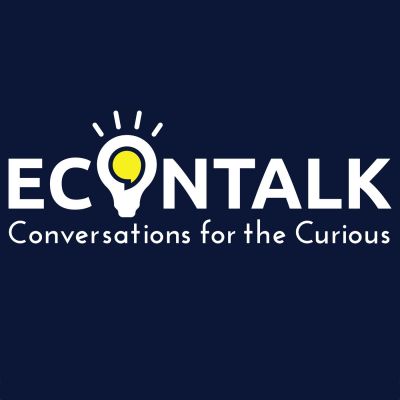EconTalk: Conversations for the Curious is an award-winning weekly podcast hosted by Russ Roberts of Shalem College in Jerusalem and Stanford's Hoover Institution. The eclectic guest list includes authors, doctors, psychologists, historians, philosophers, economists, and more. Learn how the health care system really works, the serenity that comes from humility, the challenge of interpreting data, how potato chips are made, what it's like to run an upscale Manhattan restaurant, what caused the 2008 financial crisis, the nature of consciousness, and more. EconTalk has been taking the Monday out of Mondays since 2006. All 900+ episodes are available in the archive. Go to EconTalk.org for transcripts, related resources, and comments.
https://simplecast.econtalk.org
Gesamtlänge aller Episoden: 44 days 21 hours 52 minutes
episode 675: Daniel Hamermesh on Spending Time
Economist and author Daniel Hamermesh of Barnard College and the Institute for the Study of Labor talks about his latest book, Spending Time, with EconTalk host Russ Roberts. Hamermesh explores how we treat time relative to money, how much we work and how that has changed over time, and the ways economists look at time, work, and leisure.
episode 674: Amy Tuteur on Birth, Natural Parenting, and Push Back
Obstetrician gynecologist Amy Tuteur and author of Push Back, talks about the book with EconTalk host Russ Roberts. Tuteur argues that natural parenting--the encouragement to women to give birth without epidurals or caesarians and to breastfeed--is bad for women's health and has little or no benefit for their children.
episode 673: Amy Webb on Artificial Intelligence, Humanity, and the Big Nine
Futurist and author Amy Webb talks about her book, The Big Nine, with EconTalk host Russ Roberts. Webb observes that artificial intelligence is currently evolving in a handful of companies in the United States and China. She worries that innovation in the United States may lead to social changes that we may not ultimately like; in China, innovation may end up serving the geopolitical goals of the Chinese government with some uncomfortable foreign policy implications...
episode 672: Jacob Vigdor on the Seattle Minimum Wage
Jacob Vigdor of the University of Washington talks with EconTalk host Russ Roberts about the impact of Seattle's minimum wage increases in recent years. Vigdor along with others from the Evans School of Public Policy and Governance have tried to measure the change in employment, hours worked, and wages for low-skilled workers in Seattle...
episode 671: Michael Munger on Crony Capitalism
Michael Munger of Duke University talks with EconTalk host Russ Roberts about whether real capitalism is unstable and leads inevitably to crony capitalism. They also discuss ways to prevent the descent into cronyism and speculate on their own blind spots.
episode 670: Catherine Semcer on Poaching, Preserves, and African Wildlife
Catherine Semcer of the Property and Environment Research Center (PERC) talks with EconTalk host Russ Roberts about the role of incentives in preserving wildlife in Africa. The conversation discusses how allowing limited hunting of big game such as elephants and using revenue from hunting licenses to reward local communities for habitat stewardship has improved both habitat and wildlife populations while reducing poaching...
episode 669: Jessica Riskin on Life, Machinery, and the Restless Clock
Historian Jessica Riskin of Stanford University talks about her book The Restless Clock with EconTalk host Russ Roberts. What is the difference between human beings and machines? How has science thought about this distinction? When do we have agency and when are we constrained? Riskin discusses these issues and the implications for how we think about ourselves and the growth of artificial intelligence.
episode 668: Gary Greenberg on the Placebo Effect
Author and psychotherapist Gary Greenberg talks with EconTalk host Russ Roberts about the placebo effect. Is it real? How does the placebo effect influence drug testing? If it's real, what is the underlying mechanism of why it works and how might it be harnessed to improve health care? The conversation concludes with a discussion of how knowledge of the placebo effect has influenced Greenberg's psychotherapy practice.
episode 667: Patrick Collison on Innovation and Scientific Progress
Patrick Collison, co-founder and CEO of Stripe, talks with EconTalk host Russ Roberts about the pace of innovation. Collison argues that despite enormous increases in the numbers of scientists and researchers, the pace of progress in scientific and technological understanding does not seem to be increasing accordingly. The conversation looks at the challenge of measuring innovation and whether the pace of innovation should be a matter of concern and if so, what might be done about it.
episode 666: Jennifer Doleac on Crime
Economist Jennifer Doleac of Texas A&M University talks with EconTalk host Russ Roberts about her research on crime, police, and the unexpected consequences of the criminal justice system. Topics discussed include legislation banning asking job applicants if they've been in prison, body cameras for police, the use of DNA databases, the use of Naloxone to prevent death from opioid overdose, and the challenges of being an economist who thinks about crime using the economist's toolkit.
